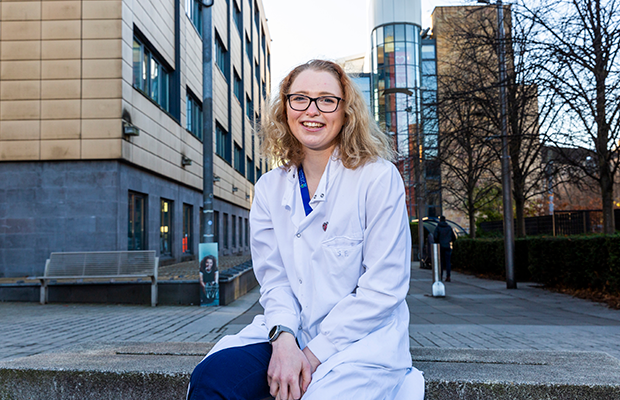
A day in the life: studying a gene that increases heart size
BHF-funded PhD student Cara Trivett studies a gene which can increase your heart size. Discover what a day in the lab looks like for her.


05:30
I’m an early riser. While I have breakfast, usually peanut butter on toast, I enjoy reading. At the moment I’m reading the original James Bond books. Then it’s a ten minute cycle to the lab, at the BHF Centre of Research Excellence at the University of Glasgow.
I’m in my second year of doing a BHF-funded PhD. My focus is to better understand the SPP1 gene – a gene that is involved in producing some of your body’s structures. Thanks to research that other BHF-funded students have done, we know this gene can be “overexpressed” (making it produce more SPP1 protein) in people with bigger hearts.
The big question is: can we find a way to stop any heart damage this gene might be causing?
Increased heart size might sound like a good thing, but it can increase the risk of having heart failure or other heart problems. By better understanding what SPP1 is actually doing in heart cells, we hope that one day we’ll use knowledge of this gene to offer the most suitable drug or preventative treatment to each person, instead of a more blanket approach.
08:00
The first thing I do in the lab is set up the sterile hoods. This is a special bench with a screen and filtered air to stop my cells getting contaminated. I put on a lab coat and face mask and spray the pipettes or any other equipment with alcohol to sterilise them. Then I get the cells from the incubator. We can change how much SPP1 is in the cell and see if this affects how the cells grow. I stain the cells to make them bright purple, to make their outline clear. I focus the microscope on them and take pictures, which I’ll later measure on my laptop. We can see that the cells with more SPP1 are bigger.
Want to get fit and healthy?
Sign up to our fortnightly Heart Matters newsletter to receive healthy recipes, new activity ideas, and expert tips for managing your health. Joining is free and takes two minutes.
I’d like to sign up10:00
After I’ve cleaned up the sterile hoods, or left an experiment running, I’ll go to the animal unit. We share about 90 percent of our DNA with rats, so through rats we can discover more about diseases in humans. We compare rats which have a gene variant that overexpresses SPP1 with healthy rats. We measure their blood pressure and look at how their heart functions using ultrasound scans.
Increased heart size can increase the risk of developing heart failure or other heart problems
12:00
After a quick break for lunch or a coffee, I might head back into the lab to finish off anything I’m working on in the sterile hoods. One of the things I’m looking at is how SPP1 proteins might be being moved between heart cells. I put the liquid that the cells are grown in into an ultra-centrifuge, which spins them at high speed. This catches messenger particles the cells have released. I then use a specialised microscope to study them.

16:00
I typically spend the rest of the afternoon putting the results onto the computer. We have a programme that allows us to run statistics and graphs so we can see patterns and differences in the data. One of the things I love about my research is the variety. It means there’s always new, small questions, leading me to the big questions: can we find a way to target SPP1 and stop any damage it might be causing, or find a predictor that allows us to intervene before the damage happens?
18:00
I squeeze exercise in before dinner, snacking on a banana with peanut butter to keep me going. I’m part of the university cycling club, so I’ll either go to the gym with them, cycle indoors or go for a run. Sport is how I keep calm and focused.
Last summer I joined 31 other BHF researchers in a challenge to raise money for the BHF’s 60th birthday and cycled 800 miles in 31 days. I’m grateful for the support I get from the BHF, so it felt important to show support in return.

20:00
I’m vegan, so for dinner I find Asian-style dishes, using tofu, beans, or chickpeas, a quick and healthy option. Then I tend to crash on the sofa, watching TV – I like not having to think too much at the end of the day!
What to read next...
BHF science helped keep me alive: Thanieth's story

Donate today



